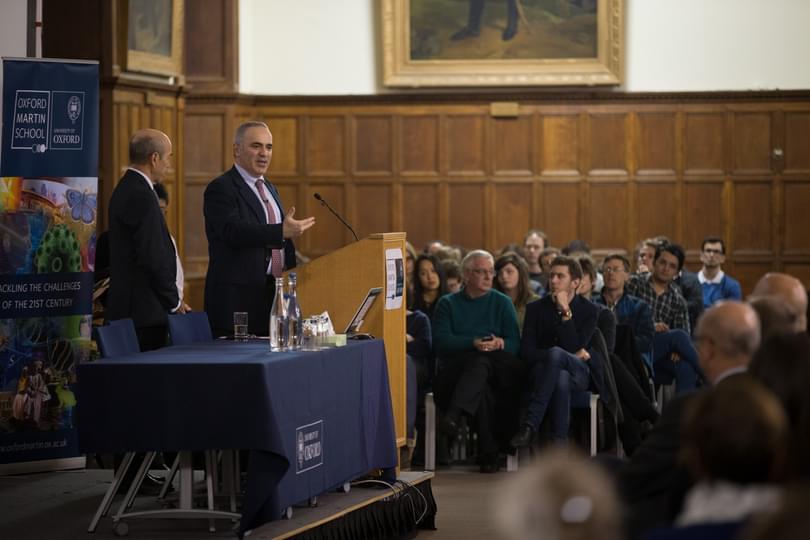
When Garry Kasparov visited the Oxford Martin School this week, he came with a strong message about innovation: society has become too risk averse and we are at risk of failing to innovate if investor mindsets don’t change soon.
During two lively workshops, the former World Chess Champion debated the future of innovation with 20 researchers from the University of Oxford, Oxford Brookes and industry. He also delivered a lecture to an audience of 440 at the University of Oxford’s Examination Schools.
Top of Kasparov’s agenda was the issue of risk aversion and its impact on societal progress.
“A fear of uncertainty holds us back from doing things quickly and productively,” he argued in his second workshop. “Just look the airline industry. Planes are getting better in terms of comfort and fuel efficiency but not going faster. Our preference is for comfort over speed. This mentality is reflected in many different areas; we have become a risk averse society.”
He went on to say: “Markets are all about short term reporting, profits and returns – a short term vision. Anything long term is unpredictable and that is psychologically unacceptable to society.”
The problem with this short term approach “is that by moving slowly we guarantee that things will get worse. By failing to take risks we will damage standards of living in the long run, as progress cannot be based on incremental change.”
Kasparov said that this attitude was now reflected in Research and Development budgets in major companies, which have been crashing for many years, with a bias instead to small, incremental improvements to existing products. This was as true for the pharma industry as it is for consumer technology.
“Many formerly innovative companies are now sitting on mountains of cash,” Kasparov pointed out. “They have stopped thinking ‘if we don't do it, someone else will’. These days young tech entrepreneurs aim to sell to Apple or Google rather than outpace them.”
Most in the workshop agreed that the investment in research had become laden down by measures that stifled innovation, with a focus on ‘publishable milestones’ trumping risk-taking. “With a pressure to publish, riskier, longer term projects that could bring genuine breakthroughs often get ignored or not funded in the first place,” argued a University of Oxford researcher.
In both workshops there was a difference of views on what level of risk aversion is acceptable. Many researchers argued that an important part of the work being undertaken in Oxford around future technology is identifying the correct degree of regulation. While not all would agree with recent declarations by Hawking or Musk that artifiicial intelligence poses one of the greatest risks to humankind, most felt that discussions about the moral and technical implications is a vital component of efforts to development them.
Kasparov’s view was that ‘Humanity is mature enough and wise enough to fix unintended consequences of new disruptive technologies’.
This view also formed a prominent part of his lecture at the Examination Schools, in which he told the audience: "I am an optimist, I believe human beings are not yet doing everything they can. There is always room for us to do something new."
